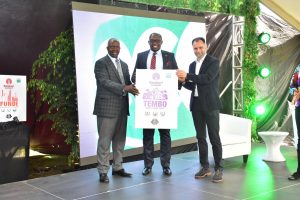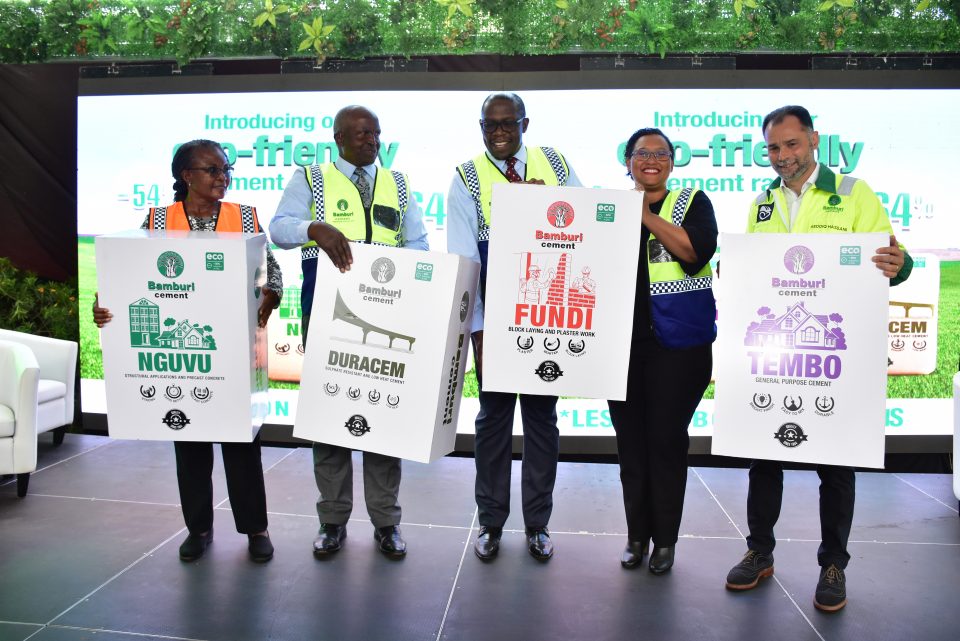Bamburi Cement unveils Eco-Label for its Four Cement Brands
By Jack Oduor
In its commitment to accelerate its operations towards attaining net zero carbon emissions, Bamburi Cement Eco-Labeled its four compliant cement brands that represent low Co2 emissions in accordance with requirements of parent company Holcim Group.
Holcim Group is the global leader in supply of construction materials and was the first global building materials company to sign United Nations Global Compact’s Business Ambition for 1.5 C ’ initiative with intermediate targets for 2030 independently validated by the Science Based Target initiative (SBTi).

The eco-label is a testimony of sustainable cement products with more than 30% reduction of CO2 emissions as compared to the pure Ordinary Portland Cements. Eco-labelled brands are being rolled out in the 70 countries with Holcim operations using the same visually distinct label. Eco-labels help customers identify at first sight the environmental impact of their purchasing choice, thereby establishing trust in what they are buying.
Speaking during the unveiling of the certification at the Nairobi Grinding Plant, Bamburi Cement Managing Director Seddiq Hassani termed this as a significant milestone for the company, in demonstrating its efforts towards the global climate change commitments of net zero emissions.
“At Bamburi we will continue to pioneer carbon footprint reporting and transparency within our sector. We are cognizant that choosing and promoting Ecolabel products makes a real contribution to the biggest environmental challenges of our time, such as reaching climate neutrality by 2050, shifting to a circular economy and reaching the zero-pollution ambition for a toxic-free environment,” Mr. Hassani said.
The four cement brands, Bamburi Fundi, Bamburi Tembo56, Bamburi Nguvu and Bamburi Duracem, will bear the Eco-label in all its packaging. Bamburi Duracem cement is at the top of the range with a massive 64% reduction in CO2 footprint.Through its Solar Energy project, Bamburi will lower energy emissions by 2025 accounting for up to 40 % of its power consumption. In addition, Bamburi plans to increase its use of rail transportation to 25% to lower its transport emissions.
During the event, Bamburi Cement also launched its 2021 Sustainable Performance Report with the theme Committed to a Sustainable Future. The report covers the company’s last fiscal year from January to December 2021, and highlights the company’s financial and non- financial performance overview and activities towards Environmental, Social, and Governance (ESG) impacts.
 The report details the progress made so far within Bamburi’s five core sustainability pillars, which include Climate and Energy, Circular Economy, People and Human Rights, Nature, as well as Sustainable Procurement.
The report details the progress made so far within Bamburi’s five core sustainability pillars, which include Climate and Energy, Circular Economy, People and Human Rights, Nature, as well as Sustainable Procurement.
The Chief Guest at the launch event, Nairobi Securities Exchange (NSE) CEO Geoffrey Odundo encouraged listed companies’ to embrace development of measurable sustainability initiatives as well as green products that are friendly to the environment.
“We are very happy that Bamburi Cement is leading the way in matters of Sustainability Reporting as a listed company. At NSE, we are working with the International Finance Corporation (IFC) to develop a tool that will be used to measure Suitability reporting for listed companies. As you all know investors and business stakeholders are really focused on this and not just return on investment,” Dr. Odundo said. “He congratulated Bamburi cement for being one of the few listed companies to release a dedicated sustainability report”
During the reporting period, Bamburi Cement achieved a reduction of its industrial emissions targets, through accelerated efforts in reducing the use of fossil fuels and replacing them with alternative fuels like biomass and industrial waste.
“Circular economy is underpinned by a transition to renewable energy and materials. By co-processing non-recyclable waste, we continually minimize our use of fossil fuels, which enables us to lower our carbon emissions and move towards a Net Zero future,” People, Organization and Sustainability Director Irene Wamanga explained.Bamburi Cement and its Ugandan subsidiary Hima Cement co-processed approximately 200, 000 tons of waste in industrial operations.
Meanwhile, as part of enhancing sustainable procurement Bamburi’s, spend on Women-Owned Businesses (WOBS) increased to 10.8 per cent in 2021 from 7.9 per cent in 2020. Additionally Bamburi increased spend on Youth-Owned Businesses (YOBS) from 2.3 per cent in 2020 to 7.9 percent in 2021.
The group spent Ksh 26 million cumulatively in contribution on positive Social impacts initiatives during the period to the benefit of 21,000 people.

